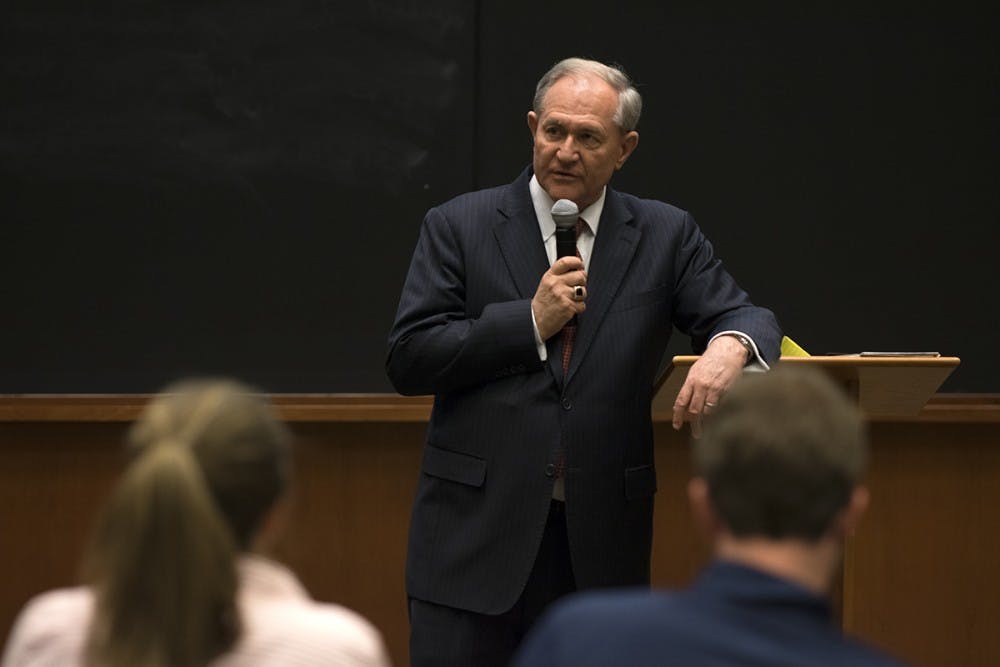The College Republicans hosted former Virginia Gov. Jim Gilmore to speak with students and faculty Monday night in Nau Hall. Gilmore talked about the influence of “leftist” ideas within America as well as his struggles of being a conservative student during his time as a student at the University.
Gilmore holds two degrees from U.Va., having earned a bachelor’s degree international relations in 1971 followed by a law degree in 1977. Along with being a member of the Jefferson Literary and Debating Society during his time on Grounds, Gilmore was a member of the College Republicans all four years of his undergraduate career and eventually held the position of vice president for the organization.
“We always love to have our alumni back here to come talk about their experiences,” said Bradley Katcher, a second-year College and Batten student who serves as the College Republicans vice chair of campaigns.
“Governor Gilmore has really been someone to shape the nation in terms of politics,” Katcher said. “He’s a landmark figure, and we are really humbled to have him come speak, and we thought his voice could be something [that our members should hear].”
Gilmore began the conversation by speaking on his struggles of being a conservative student during his time at the University. Gilmore talked about his isolation and struggle to attend the University during the late 1960s.
“Being a conservative on Grounds during those days was not easy,” Gilmore said. “It was the 60s — it was anti-war. There were student riots.”
Gilmore also discussed being on Grounds and witnessing student “riots” and activism during the Vietnam War era — in which students on Grounds demonstrated against American involvement in the war and petitioned the University administration to publicly condemn it. He also described “riots” in front of former University President Edgar Shannon’s home on Carr’s Hill and student protesters occupying the ROTC building, named Maury Hall, on Grounds.
Despite his sense of political isolation at the University, Gilmore emphasized the importance of being in organizations such as College Republicans on Grounds to encourage students to be vocal about their political viewpoints.
Garrett Scocos, a first-year College student and member of College Republicans, said he agreed with Gilmore, although he said he hasn’t experienced any anti-conservative bias during his time at the University. Scocos added that he hopes to increase representation of conservatives at the University.
“I don’t really see a lot of political bias from professors,” Scocos said, “But I will say that a lot of what he [Gilmore] said I think is true, personally, and I feel like it is frustrating because of lot of times it’s out of your control … I think being in the College Republicans you do your part to increase your representation on Grounds.”
Gilmore also spent a portion of the conversation talking about the rise of “radical leftist” influences within the United States.
During his time as Governor, Gilmore oversaw the first Republican majority in the history of Virginia the House of Delegates.
“In my opinion, the left controls the United States and controls Virginia,” Gilmore said. “The radical left now controls the Democratic Party. I don’t think it will always be that way, but I think it’s that way now. And it’s very much the culture of the United States.”
Gilmore also gave several examples of where he said Democratic biases are observed in American society, particularly in the media, which Gilmore said has significantly shaped the country.
“The media has transformed the country dramatically. Now media is not just radio and television but primarily cable television,” Gilmore said. “That begins to shape the debate and establish the standards on talks about the ways things are supposed to be in this country.”
Katcher said he hoped members of the organization took away Gilmore’s emphasis on remaining vocal about their political viewpoints.
“I think Governor Gilmore’s main message that I took [was] to be active, be vocal, stand up for what you believe in and get involved in leadership,” Katcher said. “Politics is really not a spectator sport — it's something where you should be involved, be passionate, stand up for what you believe in.”







